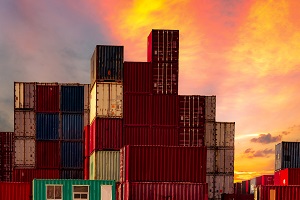
The world’s 32 Landlocked Developing Countries (LLDCs) face high transport and trade costs due to challenges including the lack of direct access to sea ports, multiple border crossings, complex administrative transit and border procedures, and limited institutional capacities. However, taking steps to simplify and streamline international trade can help LLDCs to address these challenges, enhancing their opportunities for the sustainable economic growth set out in the 2030 Agenda.
According to OECD, estimated reduction of trade costs by fully implementing the World Trade Organization’s Trade Facilitation Agreement (TFA) is 16.5%. The harmonization and simplification of trade documents alone would reduce trade costs by 4.2% for low-income countries and by 3.5% for lower middle-income countries. Automation of trade and customs processes would reduce trade costs on average by 3.6% for low-income countries and by 2.9% for lower middle-income countries. For LLDCs, these measures can be especially beneficial.
Seizing this potential, LLDCs have been making strong efforts to improve trade facilitation over the last few years. Between 2017 and 2019, the LLDCs that participated in the UN Global Survey on Digital and Sustainable Trade Facilitation 2019, improved trade facilitation implementation from 41% to 54%. This new data was reported at the Experts Group Meeting on Improving transit cooperation and trade facilitation for further integration of LLDCs in global trade, organized by the United Nations Office of the High Representative For the Least Developed Countries, Landlocked Developing Countries and Small Island Developing States (UN-OHRLLS), hosted in WTO Headquarters in Geneva on 17 October 2019, where UNECE was invited to inform stakeholders from LLDCs about the survey results as well as the use of international standards for simplification of trade procedures.
The survey findings revealed that the LLDCs are making important advances on trade facilitation implementation and most of the improvements made have been in TFA measures. But there are there are inter-sub-regional or intra-sub-regional variations in performances. For transit facilitation, LLDCs need to focus on fuller implementation of limiting physical inspection at borders and cooperation among agencies involved in transit.
The WTO TFA, and in particular, its Article 10, calls for implementation of international standards to simplify and harmonize trade and transit procedures. UNECE, through the UN Centre for Trade Facilitation and Electronic Business (UN/CEFACT), has been at the forefront of developing electronic business standards and trade facilitation recommendations for a several decades. The vast array of more than 40 policy recommendations and over 400 e-business standards are available for free to bring simple, transparent and effective processes for global businesses, and enhance an efficient and automated exchange of information, therefore helping to reduce costs by streamlining trade formalities and documentary procedures.
Some of the documentary procedures for border crossing facilitation are part of Conventions under UNECE auspices, such as the TIR Convention (which reduces cross-border transport time for goods by up to 80% and costs up to 38%) and the CMR Convention (accounting for 1 billion transport contracts issued annually, supporting seamless road freight).
The digitalization of the related documents – also with UN/CEFACT support – can help to bring additional efficiency gains, further multiplying the benefits of their use – for LLDCs and other countries. UNECE also supports projects to strengthen transport connectivity in the Euro-Asian region – which is home to about 1/3 of the world’s LLDCs.
The Experts Group discussions will inform a high-level midterm review on the implementation of the Vienna Programme of Action – which takes a holistic approach to addressing the challenges faced by LLDCs – to be held on 5 and 6 December 2019 in New York. The review will analyse the status of implementation of all aspects of the Programme – including its priority areas on fundamental transit policy issues and on trade facilitation – and identify best practices and lessons learnt as well as obstacles and constraints encountered, and actions needed to accelerate its implementation.